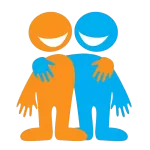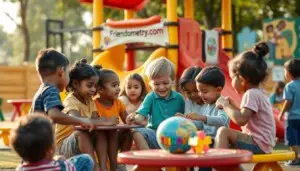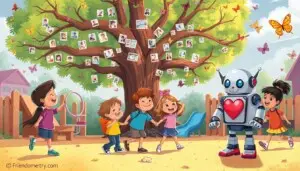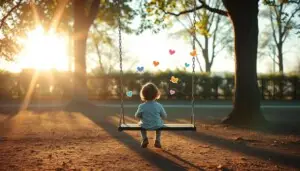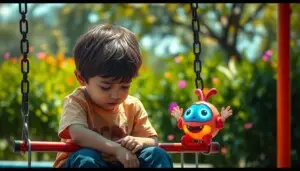Making friends can be hard, especially in today’s fast world. Many people face challenges, from feeling lonely as kids to having social anxiety. In fact, 22% of millennials say they have no friends at all.
This issue affects people of all ages, but hits kids and teens hard. Social media has changed how we make friends, often making it harder to connect for real. That’s where Friendometry.com comes in. It’s a site that helps parents set up playdates for their kids to fight loneliness.
Friendship problems can show up in different ways. For teens, wanting to fit in can change their behavior. Girls often have more trouble with friends than boys, especially in school.
Parents worry about kids copying their friends’ risky ways. For little kids, being bossy or leaving others out can make it hard to make friends. It’s important for kids to learn how to deal with these issues.
Parents and schools can teach kids how to be kind, stand up for themselves, and solve conflicts. Having just one friend can really help a child feel better. By tackling these problems, we can help kids make real friends and fight loneliness.
Key Takeaways
- 22% of millennials report having no friends
- Social media has changed friendship dynamics
- Friendometry.com helps address childhood loneliness
- Teenage girls often face more friendship issues than boys
- Empathy and conflict resolution are crucial friendship skills
- Having one friend can significantly impact a child’s well-being
Understanding the Struggle to Make Friends
Making friends can be tough, especially in today’s fast world. Many people face social isolation and peer rejection. Let’s look at what makes it hard.
The prevalence of loneliness in modern society
Loneliness is more common, especially among young adults. A study found a link between teens with close family ties and good friendships. This shows how family support can help fight loneliness.
Common reasons for difficulty in forming friendships
There are many reasons why making friends is hard:
- Anxiety when meeting new people
- Fear of rejection
- Lack of chances to socialize
- Communication barriers
- Developmental stages affecting friendship understanding
Kids see friends differently at various ages. For example, 3-7 year-olds just play together. But 11-15 year-olds form deeper connections.
The impact of social media on friendship-making
Social media can connect us, but it also makes us feel lonelier and more depressed. This can make it harder to make real friends.
| Age Group | Friendship Understanding | Key Behaviors |
|---|---|---|
| 3-7 years | Momentary playmates | Jealousy, possessiveness |
| 6-12 years | Consider friend’s perspective | Judgmental, form small groups |
| 11-15 years | Deep emotional connections | Problem-solving, mutual support |
Knowing these challenges helps us fight loneliness and build better friendships. Friendometry.com is a tool for parents to help their kids make friends and beat loneliness.
The Psychological Impact of Having Few or No Friends
Having few or no friends can really hurt a person’s mental health and feelings. A 2018 survey found 22% of millennials said they had no friends. This shows a big problem in today’s world. Not having friends can cause big mental problems.
Lack of Belonging and Its Effects
Without friends, people often feel they don’t belong. This can make them feel bad about themselves and increase stress. Having friends helps us deal with life’s ups and downs. Without them, we can feel alone and exposed.
Loneliness and Isolation
Loneliness is a big worry for those without friends. Studies show being on social media too much can make people feel lonelier and more depressed. Being with others in real life is key for feeling good emotionally. It takes about 90 hours of doing things together to really become friends.
Mental Health Consequences
Not having friends can really hurt your mental health. It might lead to:
- Increased risk of depression
- Higher anxiety levels
- Lowered self-esteem
- Difficulty coping with stress
For kids, not having friends can hurt how they act with others and do in school. Friendometry.com tries to help by setting up playdates. It shows having just one friend can really change a child’s life.
Why Can’t I Make Friends as a Kid
Making friends as a kid can be tough. Kids today have 25% less free play time than 30 years ago. This less play time hurts their social skills and how they connect with others.
School is key in making friends. Some kids are shy or have trouble reading social signs. Moving to a new school or having special interests makes it harder to fit in.
Social skills coaching can help kids get better. It’s like learning a new skill, like playing an instrument or a sport. With regular practice, kids get better at making friends. Parents can help by giving advice right away, which helps kids connect with others.
How parents act affects how well kids make friends. Being too strict can lead to bad behavior and weak friendships. But being warm and supportive helps kids be kind and manage their feelings better.
| Parenting Style | Impact on Friendship |
|---|---|
| Authoritarian | Poor-quality friendships |
| Warm and Supportive | Promotes prosocial behavior |
| Dismissive or Punitive | Weaker self-regulation skills |
For kids who find it hard to make friends, doing things together can help. Joining clubs or groups after school is a good way to meet new friends. Friendometry.com is a site where parents can set up playdates, which can really help kids make friends.
Social Anxiety and Its Role in Friendship Challenges
Social anxiety disorder (SAD) makes making friends hard. It makes many feel very nervous and self-conscious in social spots. For those with social phobia, even simple talks can be too much.
Symptoms of Social Anxiety Disorder
People with SAD often feel:
- Extreme fear of judgment
- Avoidance of social situations
- Physical symptoms like sweating or trembling
Impact on Social Connections
Anxiety stops people from meeting new friends. It can take a long time, 50 hours or more, to become a real friend. So, those with social anxiety must push past their fears.
Overcoming Social Anxiety
Good ways to handle anxiety include:
| Strategy | Description | Benefit |
|---|---|---|
| Cognitive-behavioral therapy | Helps reframe negative thoughts | Easier to build new connections |
| Gradual exposure | Slowly increase social interactions | Builds confidence over time |
| Relaxation techniques | Practice deep breathing or meditation | Reduces anxiety in social settings |
Using these strategies and getting help when needed can help beat social anxiety. Friendometry.com is a place for parents to help their kids make friends. It makes a big difference, one child at a time.
The Importance of Attachments and Belongingness
Attachments and belongingness are key to our lives. They shape our social bonds and emotional security from the start. Attachment theory shows how these connections affect our well-being and relationships.
Studies say kids who feel they belong are happier and more relaxed. They also do better in school. This shows why building strong attachments early is crucial.
Parental support and good friendships help kids feel better about themselves. They also help kids have fewer problems. Kids with secure attachments grow up to have better social skills and positive friendships.
| Attachment Type | Effects on Children |
|---|---|
| Secure | More sociable, positive orientation toward peers |
| Insecure | Increased risk of victimization, negative affect display |
For adults, strong social bonds are key for emotional security. They shield us from stress and help us handle life’s ups and downs. Sites like Friendometry.com offer tools to help parents set up playdates and build friendships for their kids.
Knowing about attachments helps us build and keep meaningful relationships. By focusing on these connections, we can boost our well-being and feel more at home.
Introversion and Its Impact on Friendship-Making
Introversion shapes how people interact and make friends. About half of us are introverts. It’s key to know their social needs.
Characteristics of Introverts
Introverts like quiet places and recharge alone. They think deeply before speaking and value deep talks. These traits can help build strong friendships.
Unique Challenges Introverts Face in Socializing
Introverts find it hard with sudden social events and get tired from being around people a lot. Many dislike small talk. This can make them feel alone, as being social is often seen as better.
Leveraging Introvert Strengths in Friendships
Introverts have special qualities that help in friendships. They listen well and ask smart questions. By focusing on one-on-one talks and shared hobbies, they can make deep connections.
| Introvert Strength | Impact on Friendships |
|---|---|
| Deep thinking | Facilitates meaningful conversations |
| Attentive listening | Builds trust and understanding |
| Preference for quality over quantity | Leads to fewer but deeper friendships |
| Thoughtful communication | Enhances emotional connections |
Strategies for Making Friends as an Adult
Making friends as an adult can be tough. With busy lives and set routines, it’s easy to feel like you’re stuck. But, there are ways to make new friends and boost your social skills.
One good strategy is to find groups with shared interests. Join clubs or groups that match your hobbies. This makes it easier to make friends. Taking classes or volunteering also helps you meet people who think like you.
Networking events are great for meeting new folks. These events let you practice your social skills in a safe setting. Often, adult friendships start with work connections.
| Strategy | Benefits | Challenges |
|---|---|---|
| Join Interest Groups | Common ground, regular meetings | Finding the right group |
| Volunteer Work | Shared values, helping others | Time commitment |
| Networking Events | Professional connections, structured interaction | Potential for superficial conversations |
| Social Media | Wide reach, convenience | Less personal interaction |
Don’t overlook online platforms. Social media can help you connect with others who like what you like. Just make sure to meet up with these online friends in real life when you can.
Building friendships takes time and effort. Be patient with yourself and others as you explore adult relationships. With persistence and an open mind, you’ll find true connections.
The Role of Shared Interests in Forming Friendships
Shared interests are key in making friends. People like to be around others who enjoy the same things. This makes it easier to connect and form strong bonds.
Joining clubs and groups
Joining clubs or groups is a great way to meet people like you. Whether it’s a book club, sports team, or gardening group, these places let you talk with others who love what you do.
Taking classes and volunteering
Signing up for classes or volunteering can help you make real connections. These activities improve your skills and get you involved in your community. You’ll meet people who share your values and interests.
Utilizing meetups and social media
Social media and meetup apps make it easy to find groups and events you like. They help you find chances to get involved and meet new people in your area.
| Activity | Benefits | Examples |
|---|---|---|
| Joining clubs | Meet people with similar interests | Book clubs, sports teams, hobby groups |
| Taking classes | Learn new skills, meet motivated individuals | Cooking classes, language courses, art workshops |
| Volunteering | Connect with compassionate people, give back to community | Animal shelters, food banks, environmental cleanups |
| Using meetup apps | Find local events and groups | Hiking groups, professional networking events, social mixers |
For parents wanting to help their kids make friends, Friendometry.com is a great tool. It’s a kid-friendly friend finder that helps set up playdates. Having just one friend can really change a child’s life.
Overcoming Small Talk Challenges
Small talk can be tough, especially when you’re meeting new people. Getting better at talking can help you make real friends. Research shows that 70-80% of people like to make friends through people they already know.
Asking open-ended questions can make conversations better and help you make friends. This method can increase the chance of making friends by 80-90%. Saying nice things to people can also start conversations well, with a success rate of 75-85%.
Being real is key to making friends. Being yourself can lead to forming friendships that last. If you’re shy, slowly getting used to being around people can help you feel more confident.
Joining in on group sports or going to social events can help you meet new people. About 80-90% of people who do this make new friends. For kids, websites like Friendometry.com can help parents set up playdates and help their kids find friends. Just having one friend can really change a child’s life.
Also, be careful with your phone in social situations. Using technology too much can make you seem less friendly to others. By following these tips and looking for chances to connect, you can beat the small talk and make real friends.

